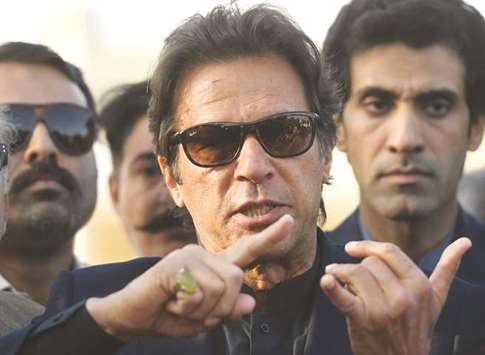Pakistan’s Supreme Court has cleared opposition leader Imran Khan of accusations of failing to declare assets, but barred his party’s secretary general from parliament.
The top court dismissed a petition to disqualify the cricket hero as an MP, months after his rival, former prime minister Nawaz Sharif, was removed from parliament by the court on similar charges.
Khan had faced being disqualified from holding political office over charges including unreported assets, namely the funds he used to buy a scenic, sprawling property in the Bani Gala hills on the outskirts of the capital Islamabad.
He has dismissed the claims as a political vendetta, explaining that he used money earned from his career as one of Pakistan’s most famous World Cup cricketers to buy the land and that he has the documentation to prove it.
“No omission or dishonesty can be attributed to him. This petition has no merits and is dismissed accordingly,” Chief Justice Saqib Nisar said, reading from the judgment to a packed courtroom.
The ruling on Khan was hailed as a vindication by his party, Pakistan Tehreek-e-Insaf (PTI), which will face off against Sharif’s ruling Pakistan Muslim League – Nawaz (PML-N) in elections next year.
Khan had led the legal drive that led to Sharif being disqualified in July over unreported income and the opening of a criminal corruption case against the former prime minister.
A lawmaker from Sharif’s ruling party filed a separate complaint late last year alleging that Khan and PTI secretary general Jahangir Tareen owned offshore companies and had not disclosed their assets.
The Supreme Court disqualified Tareen.
“The respondent is declared not to be an honest person. He ceased to be member of the parliament. The respondent is disqualified,” Nisar said of Tareen.
PTI spokesman Naeem Ul Haq said the party is disappointed with that judgment.
Tareen himself was not immediately available for comment on the matter.
Shortly after the judgment, Khan held a press conference in Karachi where he told reporters that “Pakistan’s highest court has exonerated me”.
“The taxpayers and those who earn their money through fair means and pay taxes should not be compared with the robbers and thieves,” Khan added.
“I gave 60 documents to the Supreme Court ... Nawaz Sharif, took Rs300bn out of this country which he has to answer for ... and for that he produced only one document,” he said at the press briefing.
Senior PML-N leader Miftah Ismial told Reuters that while the party questions details of the court’s ruling, it accepts that it is final.
Pakistan has been roiled by military coups and instability for much of its 70-year history, and the general election due in 2018 will only be its second ever democratic transition.
Khan established his political party in 1996, four years after Pakistan cricket team won the World Cup under his captainship.
But it was never among the top parties and did poorly in all elections it contested except the one in 2013.
Critics blame Khan for connivance with the country’s powerful military, which has ruled the South Asian nuclear-armed nation for almost half of its existence and has allegedly been acting secretly to undermine the civilian leaders.
Khan denies these allegations.
The PTI, which already holds northwestern Khyber Pakhtunkhwa province, hopes to capitalise on Sharif’s ousting and the disarray of his ruling PML-N to gain seats.
Few observers of Pakistan’s volatile politics are willing to predict with any certainty who will take the election, however.
Sharif swiftly installed party loyalist Shahid Khaqan Abbasi as prime minister after the court sacked him in late July following the corruption investigation spurred by the Panama Papers leak.
Abbasi is widely seen as a placeholder as Sharif himself has refused to relinquish leadership of the party, despite being barred from contesting elections, leaving the PML-N floundering.
Its weakness was exposed last month when it was forced to capitulate to the demands of small and previously unknown Islamist group that had held a weeks-long sit-in in the capital to demand the resignation of the federal law minister over claims linked to blasphemy.
Pakistan’s third major party, the once-mighty Pakistan People’s Party (PPP), has seen its fortunes plunge since its leader and the country’s first female prime minister Benazir Bhutto was assassinated a decade ago on December 27, 2007.
Her son 29-year-old son Bilawal, now chairman of the party, is trying to revive its political fortunes but few are gambling on it regaining its previous status in time for the polls.
If the PML-N does not recover, parties from the religious right could come together to fill the vacuum, tilting Pakistan yet further towards the religious extremism it has long grappled with.

Khan: Pakistan’s highest court has exonerated me. The taxpayers and those who earn their money through fair means and pay taxes should not be compared with the robbers and thieves.
